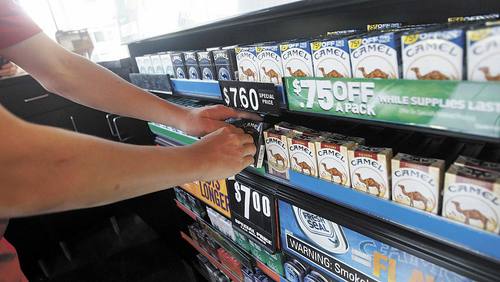The Post's View: Raising all federal tobacco taxes can stop tax avoidance
By Editorial Board, Washington Post
ENACT A LAW, and companies will find loopholes to exploit. That was the fear which drove lawmakers in 2009 to raise cigarette taxes together with taxes for roll-your-own tobacco and small cigars, both easy substitutes for cigarettes. To prevent manufacturers from shifting toward lesser-taxed alternatives, Congress equalized taxes between all three products — hiking the existing roll-your-own tobacco tax by over 24 times and small cigars by over 27 times.
These products have plunged in sales since 2009. But tobacco manufacturers, unfazed in their quest to fatten their purses, found a new loophole. Unlike these three highly taxed tobacco products, post-2009 taxes on pipe tobacco and large cigars are relatively low. All it took to shift consumers to those products was relabeling roll-your-own tobacco as pipe tobacco, and slightly adding weight to qualify small cigars as large cigars. As evidence from a recent Senate finance committee hearing shows, the popularity of pipe tobacco and large cigars have exploded.
That market shift has cost the federal government up to $3.7 billion in forgone revenue. Even worse, it’s hampered the effect of high tobacco prices on preventing teen smoking.
The first instinct might be to blame the Alcohol and Tobacco Tax and Trade Bureau, which has yet to sharpen definitions of many of these products. While action by the bureau could help close the loopholes, it faces a daunting task. For example, where should it draw the line between roll-your-own and pipe tobacco? In many cases, “it is difficult to establish objective physical standards for differentiating between the two products,” the bureau’s chief said in his testimony. Sometimes the difference is virtually nothing at all.
So forget rewriting definitions. The foolproof solution is for Congress to pass a law equalizing all tobacco taxes. That would raise taxes for pipe tobacco and large cigars to the same level as cigarette taxes, preventing any market shift. A bill introduced by Sen. Richard Durbin (D-Ill.) in 2013, still stuck in committee, would accomplish this task.
Better yet, Congress should hike all tobacco taxes — not just the lower ones — up to higher and equal levels. State taxes vary widely, from $4.35 per cigarette pack in New York to $0.17 per pack in Missouri, making smuggling a big problem for law enforcement. The current cigarette and small cigar federal tax is a meager $1.01 per pack of 20; a higher federal tax would diminish the effect of inconsistency between states and allow for a more uniform response.
These are two common-sense solutions to close tobacco tax loopholes. But the problem of tobacco manufacturers exploiting definitions has another dimension. The Food and Drug Administration, the other arm of the U.S. public health response, has proposed a long-awaited rule to expand its regulatory authority over “all” tobacco products. But premium cigars may be exempted from these regulations, potentially allowing manufacturers to “sweep other cigar products under its umbrella,” as the FDA has admitted before. This proposed exemption, as demonstrated by the tax avoidance case, is a disaster waiting to happen.

